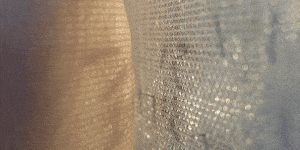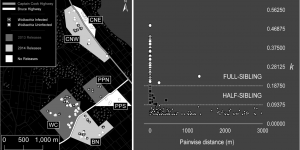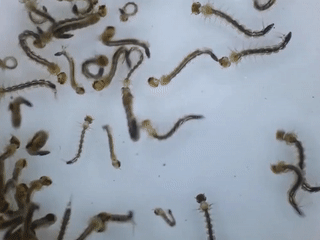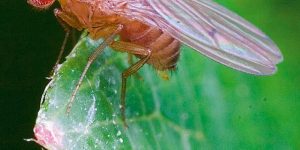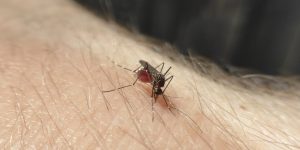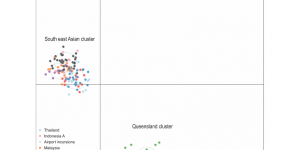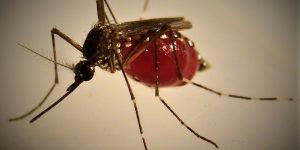Tag: dengue
-
Stowaway mozzies enter Australia from Asian holiday spots – and they’re resistant to insecticides
Original article published on The Conversation Words: Tom Schmidt, Andrew Weeks, and Ary Hoffmann We might not be able to use common insecticides to kill mosquitoes that arrive from other countries. from www.shutterstock.com Planning a trip to the tropics? You might end up bringing home more than just a tan and a towel. Our latest […] -
Probing the void for blood
Words and video: Perran Ross I recently filmed one of our mosquito colonies trying desperately to reach my arm through their enclosure. The video has been posted on Reddit by a third party and received enormous attention with over 4.5 million views in its first nine hours. To make the video, I held my arm […]blogs.unimelb.edu.au/pearg/2018/07/10/probing-the-void-for-blood
-
New publication | Fine-scale landscape genomics helps explain the slow spatial spread of Wolbachia through the Aedes aegypti population in Cairns, Australia
Author summary and figures by Tom Schmidt Wolbachia is a bacterium that suppresses the capacity for arbovirus transmission in the mosquito Aedes aegypti, and can spread spatially through wild mosquito populations following local introductions. Recent introductions in Cairns, Australia have successfully established Wolbachia in the Ae. aegypti population, but the infection has spread more slowly than expected […] -
Collecting fresh mosquitoes | PEARG in the field
Words: Tom Schmidt Photos: Tom Schmidt and Perran Ross At PEARG, we have a great interest in environmental pests and how to deal with them. One of these pests is the mosquito Aedes aegypti, which causes catastrophic damage throughout the world’s tropical zone. Aedes aegypti spreads viruses such as dengue, Zika and chikungunya, and is […]blogs.unimelb.edu.au/pearg/2018/04/30/collecting-fresh-mosquitoes-pearg-in-the-field
-
The Wolbachia pandemic | Symbionts spread rapidly across highly diverged flies
Words: Perran Ross Cover photo: Andrew Weeks Wolbachia are perhaps the most prevalent bacterial symbionts on earth. Of the millions of insect species, Wolbachia are estimated to infect up to half of them. These bacteria are renowned for the effects they exert on their hosts, which can often be quite dramatic. Some Wolbachia strains are […] -
WOLBACHIA BACTERIA IN ACTION | How we’re using naturally occurring bacteria to stop mosquitoes from spreading disease
Words and images: Perran Ross Cover photo: Jason Axford Dengue is a major global health issue. It infects millions of people every year and can cause debilitating illness, inflicting joint pain, rash and fever. Without any effective vaccine, the best way to prevent dengue is to target the mosquitoes that transmit it. Dengue is spread […] -
New review | The detection and significance of emerging insecticide resistance in mosquitoes
Nancy, Andrew and Ary have a fresh review article in CSIRO’s ‘Microbiology Australia’ journal. Below is the abstract, for the full text please follow this link. Mosquito-borne arboviruses are increasing in incidence around the world. Australia enjoys some protection from pests and diseases afforded by its geographic isolation coupled with strict biosecurity control at its […] -
Picky feeders: Mosquitoes turn their nose up at non-human blood
Words: Ellen Cottingham Image: Perran Ross Most Australians have sat outside on a summers evening only to return inside to find their legs and arms dotted with fresh itchy mozzie bites. It is not widely known that only female mosquitoes bite warm blooded animals or humans. The reason for this is that females use protein […]blogs.unimelb.edu.au/pearg/2018/02/23/picky-feeders-mosquitoes-turn-their-nose-up-at-non-human-blood
Number of posts found: 18
